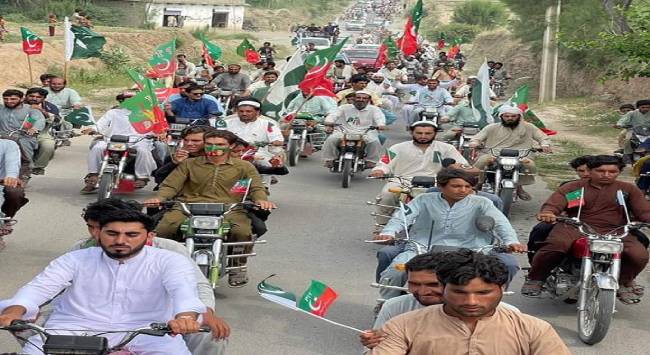Summary
Pakistan’s political and economic future is faced with uncertainty in the wake of recent dramatic events, from the arrest of former prime minister, Imran Khan, to the nation’s eager anticipation of a caretaker government and impending elections.
Earlier this month, Pakistan’s Prime Minister Shahbaz Sharif proposed the dissolution of parliament on 9 August 2023 and a caretaker government to assume responsibility for a constitutional 90-day term, pinning Pakistan’s hope toward free and fair elections in November this year. The concept of a caretaker government was first added to the 1973 constitution by General Zia-ul-Haq in 1985. After a few constitutional amendments since then, the roles and responsibilities have been consolidated in the Election Act, 2017.
However, the journey toward these elections seems rather complex. Last week, the Council of Common Interests approved the results of the 2023 digital census requiring at least four months to draw new constituency boundaries, thus, predicting a definite delay in the highly anticipated elections. Simultaneously, the recent sentence and disqualification of former prime minister, Imran Khan, from politics for the next five years proved to be another attempt by the Pakistan Democratic Movement (PDM) coalition to weaken the stronghold of the populist leader, following his ouster through a no-confidence motion in April 2022. According to renowned journalist Zahid Hussain, “It all seems to be going according to script. The plan is to keep Khan out of the electoral race.” This reinforces dynastic politics in Pakistan, with the age-old Pakistan Muslim League and Pakistan Peoples Party as the major competitors in the upcoming elections. However, it is yet to be determined if Pakistan Tehreek-e-Insaf (PTI), with a popular supporter base, can stand its ground without its charismatic leadership.
In the 2018 elections, the PTI celebrated its historic victory as Khan’s campaign and vision of a “new” Pakistan appealed to the younger voter base, disillusioned by the stale promises of his predecessors. According to the opposition parties, Khan’s unprecedented win alluded to alleged rigging amidst suspicion of the military’s notorious interference in skewing the political outcome. However, it became difficult for Khan to sustain his five-year tenure following a supposed fall-out with the establishment, anti-American rhetoric and a deepening economic crisis. During his term, Khan’s leadership was further tested by significant global events such as the outbreak of the COVID-19 pandemic, India’s abrogation of Article 370, the United States’ withdrawal from neighbouring Afghanistan and the soaring inflation of an already fragile economy post-Russia’s invasion of Ukraine.
The PTI government faced criticism from its opponents for its lack of rational decision-making on critical domestic and international issues, which intensified mistrust within the parliament against the ruling party. Following the PTI’s replacement with the PDM coalition and Khan’s initial arrest on corruption charges in May this year, the nation plunged into intense political polarisation, defining the electoral landscape for the upcoming general elections. However, combined with the ongoing political instability and weak democratic institutions, the most pressing challenge gripping the nation is its worst-ever economic crisis – an outcome of years of economic mismanagement and successive corrupt regimes. The inflation rate is at an all-time high since 1974 as the rupee has depreciated by 28.4 per cent in the current fiscal year, cueing major financial reforms.
The expectation from the incoming government, whenever that would be, is not to reverse years of damage but to exercise immediate and effective damage control policies, a skill that some of the seasoned politicians and parties might possess. After long-drawn and tough negotiations, the International Monetary Fund (IMF) finally approved the US$3 billion (S$4.07 billion) bailout for Pakistan. According to Sharif, “It bolsters Pakistan’s economic position to overcome immediate to medium-term economic challenges, giving [the] next government the fiscal space to chart the way forward.” By removing Khan, whose populist narrative, at least, appeased the masses, the remaining competitors will have to campaign and deliver robust fiscal policies for economic stability and to restore the trust of the deeply disappointed population.
Besides Pakistan’s economic conditions, its foreign relations and national security have also deteriorated, due to turbulent domestic politics. Khan’s untimely visit to Russia at the height of the Russia-Ukraine crisis, intention to renegotiate Pakistan’s role in China’s Belt and Road Initiative, inconsistent relations with strategically significant Middle Eastern allies and support for the Taliban takeover in Afghanistan have pushed Pakistan to the periphery of the international community. While Pakistan has made remarkable progress in fencing its porous borders with Afghanistan, there is a resurgence of terrorist attacks post-Taliban takeover, threatening the nation’s already compromised national security. This posits a compelling reason for Pakistan’s highest echelons of power to put political grievances aside and coalesce for the sake of its survival.
In the forthcoming elections, the hybrid civilian-military government will have to strategise reforms to stabilise Pakistan’s foreign policy and national security strategy.
. . . . .
Dr Imran Ahmed is a Research Fellow at the Institute of South Asian Studies (ISAS), an autonomous research institute in the National University of Singapore (NUS). He can be contacted at iahmed@nus.edu.sg. Ms Hatizah Rashid is a research intern at the same institute. She can be contacted at Hatizah.Rashid@anu.edu.au. The authors bear full responsibility for the facts cited and opinions expressed in this paper.
Pic Credit: PTI’ Twitter Account.
-
 More From :
More From :
-
 Tags :
Tags :
-
 Download PDF
Download PDF


